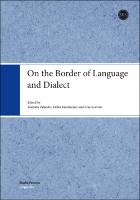On the Border of Language and Dialect
Contributor(s)
Palander, Marjatta (editor)
Riionheimo, Helka (editor)
Koivisto, Vesa (editor)
Language
EnglishAbstract
"This volume considers the linguistic borders between languages and dialects, as well as the administrative, cultural and mental borders that reflect or affect linguistic ones; it comprises eight articles examining the mental borders between dialects, dialect continua and areas of mixed dialect, language ideologies, language mixing and contact-induced language change. The book opens with Dennis R. Preston’s review article on perceptual dialectology, showing how this field of study provides insights on laymen’s perceptions about dialect boundaries, and how such perceptions explain regional and social variation. Johanna Laakso problematizes the common notion of languages as having clear-cut boundaries and stresses the artificialness and conventionality of linguistic borders. Vesa Koivisto introduces the Border Karelian dialects as an example of language and dialect mixing. Marjatta Palander and Helka Riionheimo’s article examines the mental boundaries between Finnish and Karelian, demonstrated by the informants when recalling their fading memories of a lost mother tongue. Niina Kunnas focuses on how speakers of White Sea Karelian perceive the boundaries between their language and other varieties. Within the framework of language ideology, Tamás Péter Szabó highlights the ways in which linguistic borders are interactionally (co)constructed in the school environment in Hungary and Finland. Anna-Riitta Lindgren and Leena Niiranen present a contact-linguistic study investigating the vocabulary of Kven, a variety lying on the fuzzy boundary of a language and a dialect. Finally, Vesa Jarva and Jenni Mikkonen approach demographically manifested linguistic boundaries by examining the Old Helsinki slang, a mixture of lexical features derived from Finnish and Swedish. Together, the articles paint a picture of a multidimensional, multilingual, variable and ever-changing linguistic reality where diverse borders, boundaries and barriers meet, intertwine and cross each other. As a whole, the articles also seek to cross disciplinary and methodological boundaries and present new perspectives on earlier studies.
Keywords
minority languages; language ideology; multilingualism; dialect; slang; borrowing; Finland; Finnish language; Karelia; Karelian language; Kven people; Loanword; Swedish languageDOI
10.21435/sflin.21ISBN
9789522229168; 9789518580037; 9789518580044OCN
1051778170Publisher
Finnish Literature Society / SKSPublication date and place
Helsinki, 2018Series
Studia Fennica Linguistica, 21Classification
Sociolinguistics
Historical and comparative linguistics


 Download
Download